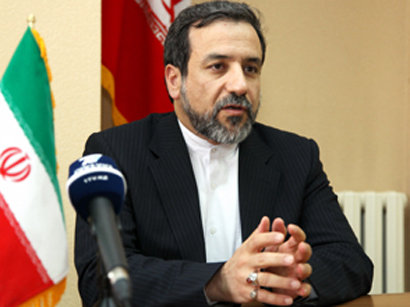Iran says no agreement with U.S.

By Sara Rajabova
Iran rejected the reports on reaching an agreement with the United States on the number of centrifuges, which is one of the main issues of controversy between negotiating sides.
Iran's Deputy Foreign Minister Abbas Araqchi said on September 7 that no agreement has been reached with the U.S. regarding the number of centrifuges, IRNA reported.
Araqchi rejected the Western media report alleging Iran has agreed with the United States to reduce the number of centrifuges to 7,000.
He described the Geneva Accord reached between Iran and P5+1 last November as a "ceasefire agreement" based on which both Iran and the other sides undertook a number of commitments to prepare the ground for a comprehensive agreement to resolve the nuclear dispute.
However, he said that if the sides fail to achieve an agreement by November 24 deadline, everything will return to what they used to be. Araqchi also hoped that Iran and the P5+1 would agree on a comprehensive agreement within the remaining time so that the dispute would be resolved and all the sanctions on Iran would be lifted.
Iran and the U.S. finalized the two-day talks on Tehran's nuclear energy program on September 5.
Despite the fact that the sides have failed so far to bridge the gaps, Araqchi called bilateral nuclear talks with the U.S. "good" and "useful".
Araqchi and Iran's Deputy Foreign Minister for European and American Affairs Majid Takht Ravanchi were heading Iranian delegation while the U.S. delegation was led by Deputy Secretary of State William Burns and Under Secretary of State in Political Affairs Wendy Sherman.
The bilateral talks between Iran and the U.S. were the second one after Vienna 6 negotiations. The negotiations between Tehran and Washington took place within the framework of bilateral talks with the P5+1 (the five permanent members of the UN Security Council comprised of China, France, Russia, Britain, the U.S., plus Germany).
The two sides are discussing ways of reaching a final agreement over Tehran's nuclear energy program. They clinched a landmark interim deal in Geneva, last November. The agreement, which took effect on January 20 and expired six months later on July 20, has been extended until November 24.
Here we are to serve you with news right now. It does not cost much, but worth your attention.
Choose to support open, independent, quality journalism and subscribe on a monthly basis.
By subscribing to our online newspaper, you can have full digital access to all news, analysis, and much more.
You can also follow AzerNEWS on Twitter @AzerNewsAz or Facebook @AzerNewsNewspaper
Thank you!
